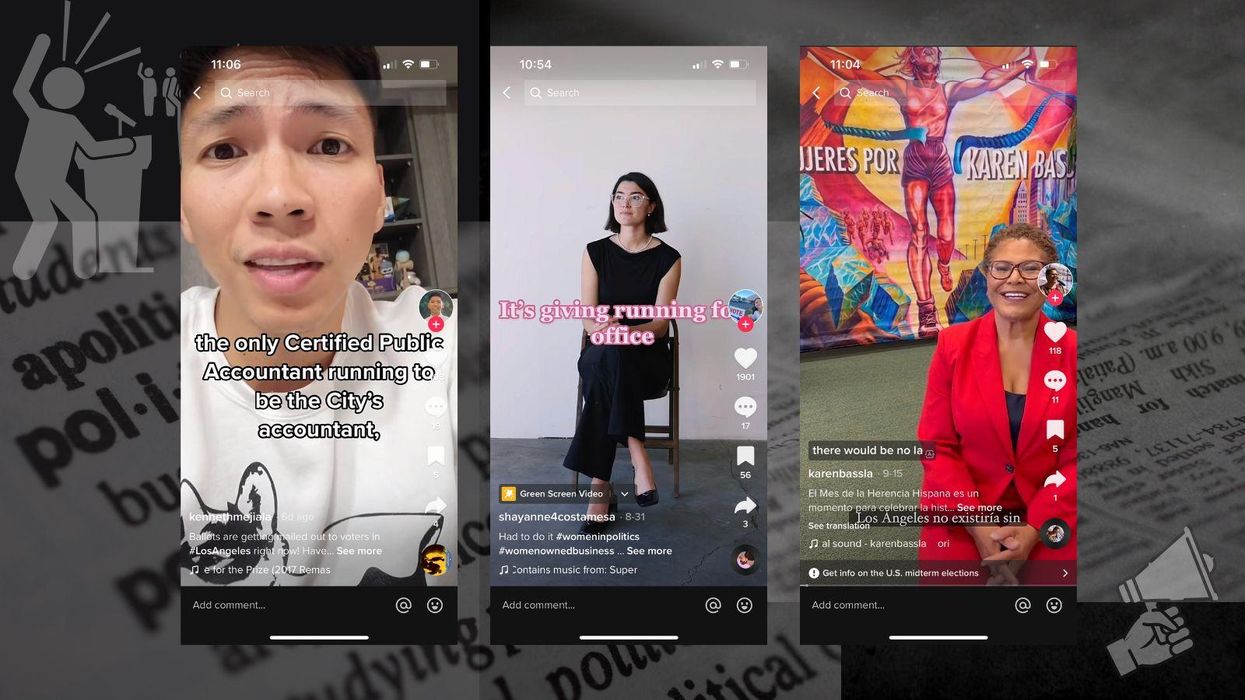Local Political Candidates Are Using TikTok To Communicate with Young Voters
Kristin Snyder is dot.LA's 2022/23 Editorial Fellow. She previously interned with Tiger Oak Media and led the arts section for UCLA's Daily Bruin.

In March, congresswoman and mayoral candidate Karen Bass documented submitting her paperwork to run for L.A. mayor on TikTok.
The video has just over 1000 views. Compared to her 14,000 Instagram followers and 46,000 Twitter followers, her 141 TikTok followers don’t amount to much.
Still, it reflects the growing number of political candidates trying to make the video-sharing app work for them.
That TikTok has exploded in recent years is hardly news. The app hosts 138 million active users in the United States, and 60% of its overall users are considered members of Gen Z. Teens and young adults have already utilized the app for political activism that ranges from sabotaging a Donald Trump rally to advocating for abortion rights.
Now, politicians have caught on to the fact that if they want to reach younger audiences, they have to be on TikTok.
“What we're seeing now is this gold rush where politicians are trying to be the first to stake their claims in this relatively unknown world of this medium that very few of them are actually using themselves,” says UC San Diego Political Science Professor Thad Kousser.
Though in 2018 midterms youth turnout nearly doubled and in 2020, the number of young people increased by 11%, turnout at local elections remains low. Engaging voters in local races has also proven to be difficult—in the 2017 Los Angeles mayoral election, only 20% of registered voters actually filled out their ballots.
But, platforms like TikTok can help boost the visibility of local candidates, according to University of Pennsylvania Professor Pinar Yildirim, who has previously studied how social media impacts political fundraising. Historically, smaller candidates have struggled to catch the mainstream media’s attention, making it more difficult to spread their message. Which is why they’re turning to TikTok.
@realpastorbrian Why can't we focus on real issues? I'm not going to be distracted. My people are suffering. Who is realpastorbrian.com #lgbt🌈 #blm #republican #gop #democrat #realissues #share #duet
In Orange County, Rep. Katie Porter has gained over 300,000 followers on the platform even while her account primarily reposts videos of media appearances. San Fernando Valley Rep. Tony Cárdenas shows off a staffer’s dog, grabs an electric vehicle charger and highlights bills that have passed in his TikTok videos that have earned thousands of views. In the Inland Empire, Republican congressional candidate Brian Hawkins often speaks directly to the camera as he urges people to focus on “real issues.” And when he does, he is speaking to an audience of nearly 115,000 people.
Even those seeking less-known political office are gaining traction one lip-synching video at a time. In Los Angeles, city controller candidate Kenneth Mejia has gained 9,000 followers through trending audios and dances.
Shayanne Wright, a candidate running for the Mesa Water District Board in Costa Mesa first started her account in February. She’s since posted once a day to build up her 1,516 followers. Wright admits that policy-specific videos get little traction. But her day-in-the-life videos have gone viral, such as one showing off potential photo shoot outfits that has gained over 34,000 views.
“I think people would be surprised how powerful the algorithm is, and something I really like about creating content on TikTok is that you know it's going to land in front of a similar audience,” Wright says.
@shayanne4costamesa Running for office feels like i literally learn something new everyday! 🤓 #localpolitics #secretaryofstate #ballot #womeninpolitics #costamesa #orangecounty #politics #democrat #vote #election #localgovernment
At 25, if Wright wins, she’ll be the youngest elected official in Costa Mesa. She says being young and a native social media user has helped leverage TikTok to her benefit. She tries to jump on trends before they grow stale, and she says she finds ways to make them more professional—a Nicki Minaj song can accompany campaign photos and a Steve Lacy song can be in the background of door-to-door canvassing.
To her credit, Wright doesn’t believe that TikTok following is necessarily an indication of her campaign’s success. But it has brought in donations and supporters, including five volunteers who found her through the platform.
To similar ends, Jurupa Valley City Council candidate Armando Carmona often posts about hyperlocal issues. His first few videos to take off since beginning his account in August highlighted his childhood in Jurupa Valley and outlined how he wants to aid the community. Since then, he has earned 1,557 followers, many of whom are young people in Jurupa Valley.
“Voters are looking for leaders and representatives that they're going to be able to communicate with in their own terms and in their own ways,” he says. “The new way of communicating with large amounts of people is through social media.”
Platforms like TikTok have become crucial for his campaign to reach people, as he says Jurupa Valley is limited in traditional media outlets.
“We started posting on TikTok because there's a void of information, and there's a lot of folks that are very interested in what's happening in their community,” Carmona says.
But amassing thousands of followers doesn’t always translate to thousands of voters. Kousser says TikTok can make it hard to foster a loyal base. Its finicky algorithm doesn’t always push videos to people who follow a user, and it is less focused on cultivating a social network. Not to mention, political concerns around privacy can put some candidates in a tricky position—using the app seems to be crucial for reaching young voters, but further measures taken against TikTok could make some candidates’ usage appear hypocritical.
But one thing is clear, Gen Z isn’t going to ditch the app anytime soon. Which is why, for the time being, Kousser says, local politicians should be asking themselves two questions. First, are these eyeballs winning votes? And second, are these eyeballs in my district?
- TikTok Spreads Disinformation About Kenyan Election - dot.LA ›
- A Breakdown of the Data TikTok Collects on American Users - dot.LA ›
- TikTok is The Most Downloaded App - dot.LA ›
- Republicans Have a Love-Hate Relationship With Electric Vehicles - dot.LA ›
- TikTok Politics: Why More Candidates Are Turning to Video - dot.LA ›
- Why Students are Bypassing TikTok Bans on Campus - dot.LA ›
- AI Still Has a Ways to Go Before it Truly Impacts Politics - dot.LA ›
Kristin Snyder is dot.LA's 2022/23 Editorial Fellow. She previously interned with Tiger Oak Media and led the arts section for UCLA's Daily Bruin.



 Image Source: Perelel
Image Source: Perelel
 Image Source: Valar Atomics
Image Source: Valar Atomics Image Source: Waymo
Image Source: Waymo Image Source: Apple
Image Source: Apple